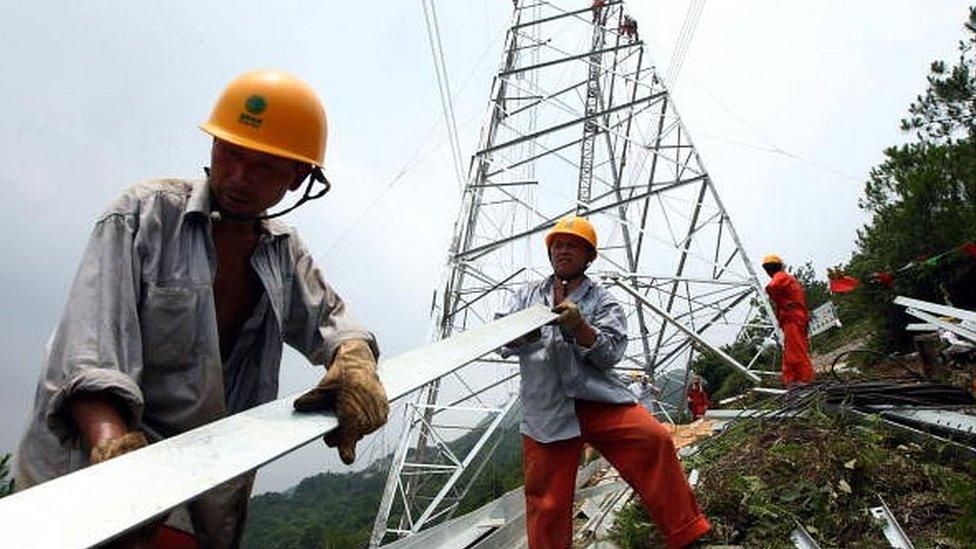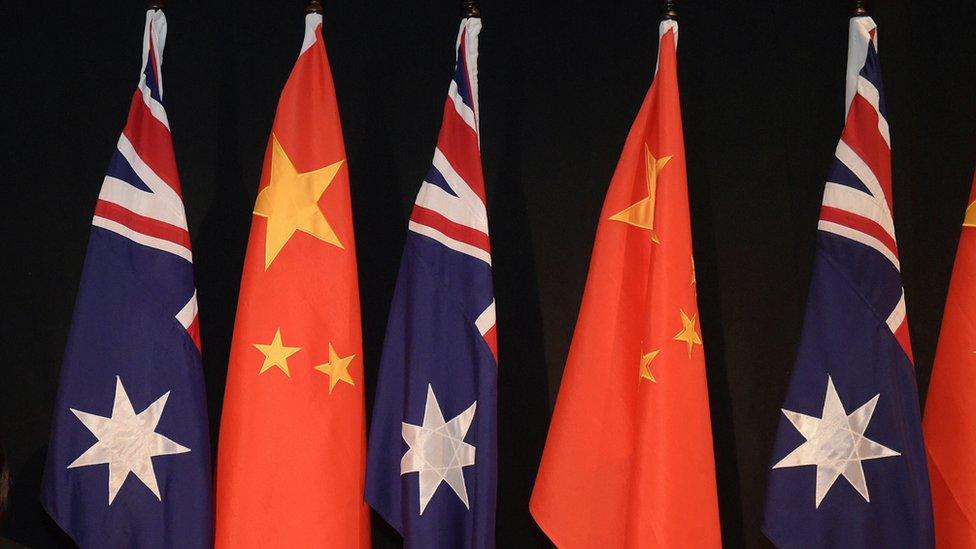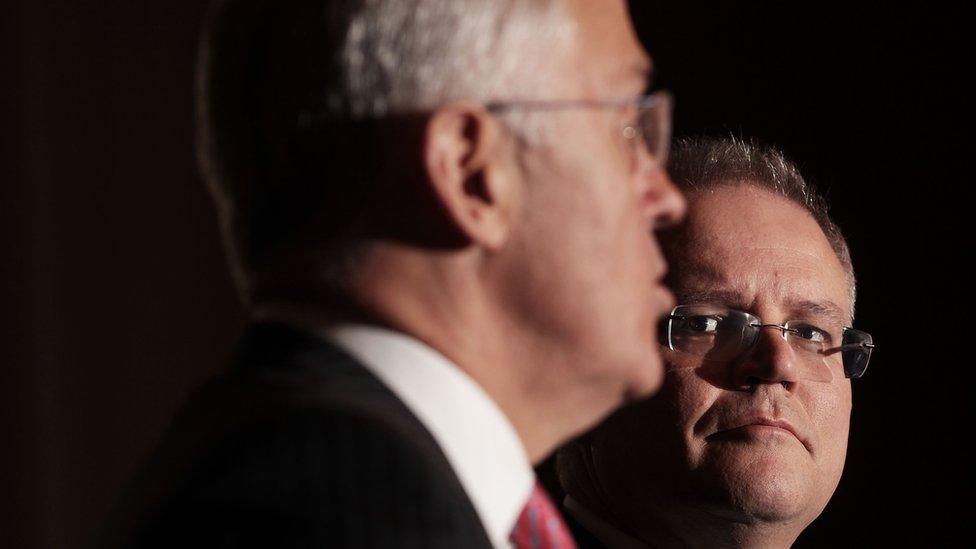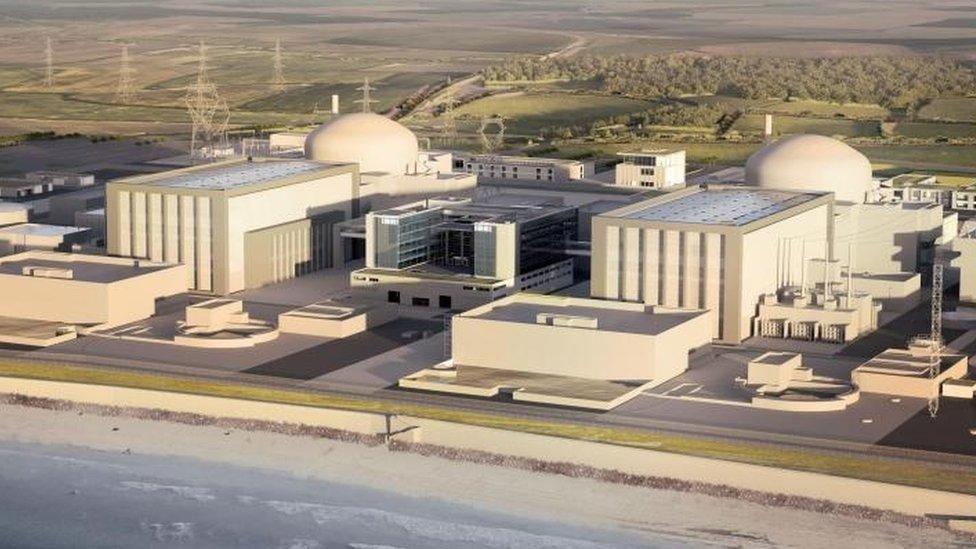Australia risks Chinese anger over power grid sale
- Published

Australia's decision to preliminarily block Chinese and Hong Kong bidders from taking a controlling stake in Ausgrid, the country's largest Australia network, over national security concerns, is likely to be met with outrage and indignation in China. The Chinese don't like being snubbed.
That's not surprising - after all, who likes being dumped? And this is starting to look like a recurring pattern. Australia's move comes as the UK has postponed approval for the Hinkley point nuclear power project, in which China's General Nuclear Power Corp will have a minority stake, on similar concerns.
CGN is also accused of leading a conspiracy to steal American power industry secrets to speed up the development and production of Chinese reactor technology. Szuhsiung Ho, a senior adviser to CGN, is due in court in the US next week, and is accused of recruiting American experts to obtain sensitive nuclear technology for China, in a plot that prosecutors say threatened US security.
But the UK's snub has already had serious consequences - verbally at least. Writing in the Financial Times, China's ambassador to the UK, Liu Xiaming has said the delay to approving the plant had brought the two countries to a "crucial historical juncture."
He hinted that "mutual trust" could be in jeopardy if the UK government decided not to approve the deal.

There's been no official comment yet about the blocking of the Australian deal from China's State Grid Corp. But it is a state owned enterprise, and this may be seen as an affront to China's global ambitions, or viewed as yet another attempt to cast doubt on China's motivations in the international business arena.
State Grid Corp was attempting to buy a 50.4% controlling stake in Ausgrid in a deal reportedly worth some $7.5bn (£5.8bn).
Hong Kong's Cheung Kong Infrastructure Holdings, owned by HK billionaire Li Ka-shing, was also bidding separately - and has quickly distanced itself from this rejection.
In a statement to the BBC, it said: "We believe that the Australian government must have reasons beyond the obvious which led them to make today's announcement. The issue is unrelated to CKI."
The rejection of CKI is being read by some Australian commentators, external as a consequence of the close ties between the firm's billionaire boss Li Ka-shing and the Chinese government.
It's not you, it's me. Or perhaps it is you…
There have been lots of Chinese investments in Australia that have gone through without a hitch. But this time, Australian Treasurer Scott Morrison has said that the foreign investment proposals from both bidders "were contrary to the national interest."
He hasn't provided any further details, just saying national security issues were identified in critical power and communications services that Ausgrid provides to businesses and governments.
It's too early to draw too many parallels to the UK's Hinkley deal - but on the surface at least, there are some. In the Hinkley plant delay, the UK didn't explicitly say national security concerns were a major factor, but there have been reports that the new British Prime Minister Theresa May was concerned about Chinese involvement in a UK nuclear power station, and that was the primary reason for postponing the deal.

China snubbed
This isn't the first time that a Chinese led consortium has been rejected in Australia or elsewhere around the world - just take a look at the deals that have been rejected over the last few years:
July 2016: The United Kingdom postpones approval for a new nuclear reactor plant in which China's General Nuclear Power Corporation would have a minority stake, on security concerns
May 2016: Australia blocks Chinese consortium led by Shanghai Pengxin Group from buying an 80% stake in Kidman & Co - the world's biggest cattle farm - on concerns that it would not be in the "national interest".
March 2012: Australia blocks China's Huawei Technologies from tendering for contracts for National Broadband Network, over cyber-security concerns. Huawei has also encountered problems in the US over security concerns.

But is snubbing China justified? Not everyone thinks so.
"When the government decided to stop Huawei from buying the national broadband network in 2012, that made sense," says Hugh White from the Australian National University.
"If you have a lot of intelligence equipment in the national broadband network, you can conceivably gather a lot of sensitive data. But what's the concern over a power grid - that the Chinese might turn off the electricity? That's absurd."
Mr White added that it was hard to determine what national security concerns Australia has because the government has not made those issues clear.
"Australian governments have proved to be very poor at understanding how to manage relations with China - they are a bit bewildered by China's rise," he said. "We need to figure out how we live in a world where China has become the principal economic player in our neighbourhood."

Australia has blocked several purchases by Chinese companies on national security grounds
But it's not just about politics or security concerns.
"It is pretty clear that Australians and local bidders are becoming frustrated that they cannot compete in the bidding process of assets being privatised on the back of premiums Chinese or HK players are wiling to pay," Lindsay David, the co-founder of LF Economics, tells me.
China's economic rise will no doubt continue - and even if the economy is slowing down, its ambitions to own assets overseas won't grind to a halt. Increasingly Chinese companies also have the ability to spend more than other firms. That is bound to create some resentment in the marketplace.
It's not hard to see why China is sometimes the object of suspicion, when it comes to these overseas acquisitions.
But the countries that China wants to invest in will increasingly have to balance their national security concerns, with their economic and commercial ones too.
- Published29 July 2016

- Published19 April 2016
